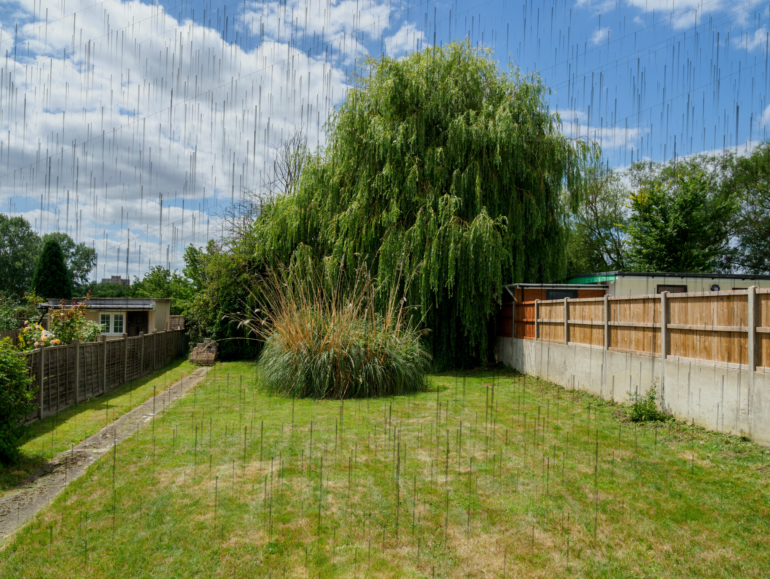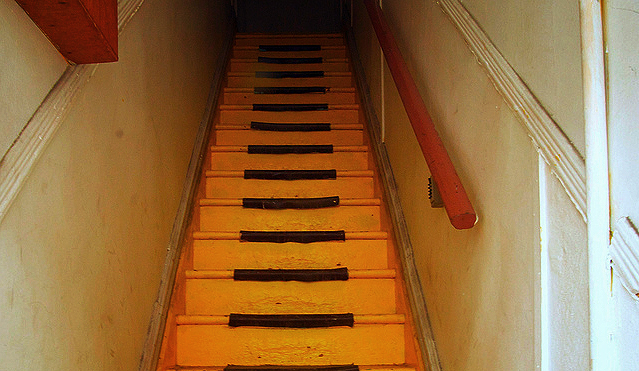Amy DeBellis
At first, they leave slowly. We watch them go one by one: small silvery threads floating up from the earth like strands of spiderweb, moving gently towards the sky. My dad stands in the yard with me, mutters something about a new species of worm, but he doesn’t look convinced. Scientists squirm on television, clear their throats, trade theories about “unidentified anomalous phenomena” and “unknown atmospheric occurrence.” People call into fundamentalist radio shows claiming the strings are the souls of those who have been chosen to go to heaven. Others think that they are ghosts, or dreams.
After a few hours, the leaving increases. The threads float up in greater numbers, more confident now, flocking to some unseen call. They shiver past in clusters, twinkling along their lengths, throwing off light like strands of sunlit water. I want to touch them, but my dad says No, wait. More and more people appear in their yards, pull over to the sides of busy highways, dash out of office buildings to gaze at the gleaming threads. They stand there slack-jawed, the same way a dog will hold its mouth open in a thunderstorm: panting, waiting, trembling.
My mother comes running out of the house, screen door bouncing behind her, yelling that she can’t find Ralph. Ralph is our terrier who, after the age of thirteen, has become an almost immovable fixture on our living room rug. We hunt for him for hours that afternoon, far beyond the boundaries of where his own legs could have taken him, but we can’t find him.
Later that evening, sitting in taut wordlessness, we realize that the sound of the crickets has grown softer, their normally aggressive nighttime chirping dwindled to a barely audible susurration. Like music that’s been turned down. And as they have done all day, the strings continue to float by. Seen in darkness, through our windows, they glow a little. Watching them, I get the impression that our house is underwater and the threads are bioluminescent creatures drifting past on some auspicious current, departing for a better place, leaving us behind.
The next morning, I hear almost no birds. The threads continue to float away. I touch one for a second and feel nothing besides a slight warmth, but later that day my dad tells me that Carol from next door is in the hospital. Apparently she grabbed one and tried to hold on, tried to stop it from leaving. It burned a hole right through her hand, he says.
That evening, a conspicuous lack of mosquitoes. My dad decides to have an outdoor barbecue, a tradition we haven’t indulged in for years, but no one can seem to muster up any enthusiasm. Being in our yard makes obvious the new gaps in the foliage, the thinning trees, the soil giving way to bare rock. We eat juicy hot dogs under a cloudless sky, the threads wafting by, and later that night, the stars seem to be winking out.
Every nonhuman species is jeopardized now, slipping down the list from vulnerable to endangered to critically endangered in the space of just a few days. No one can do anything. Leopards, horses, cats, penguins, spiders: in less than a week, every single one disappears. They disappear along with the forests, with the oceans that pull back like grinning mouths to reveal beds of desiccated sand.
The planet is shedding all the things that we have raged against for centuries, the natural phenomena we have trimmed back and reviled and tried to force out of our lives. There are fewer threads now, trickling leisurely upwards, slow stragglers: the last bird, the last carpenter bee, the last flower.
Then the threads are gone, and there’s only us. Us and our new world of metal and rubber and titanium—steel, plastic, chrome. Everything ringing hollow and antiseptic, dry riverbeds like drained arteries. We pace the graveyard of our planet and paw through the rubble, searching in vain for specks of treasure: an insect that turns out to be a dark knot of fabric, a leaf that on second glance is only a hundred dollar bill. We tuck photographs of birds and ocean-blue shards of plastic into our pockets, barter them for food. We walk around without song or purpose and every so often we lift our faces to the sky, as though we might still feel rain.
Amy DeBellis is a writer from New York. Her work has appeared or is forthcoming in various publications including Flash Frog, Pithead Chapel, HAD, Maudlin House, Atticus Review, and JMWW. Her debut novel is forthcoming from CLASH Books (2024).
Photo by Brett Jordan on Unsplash



